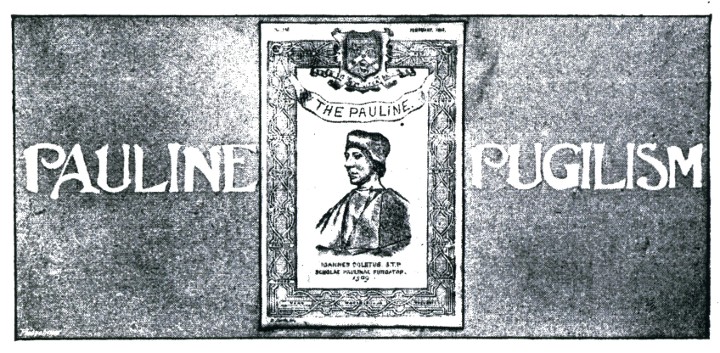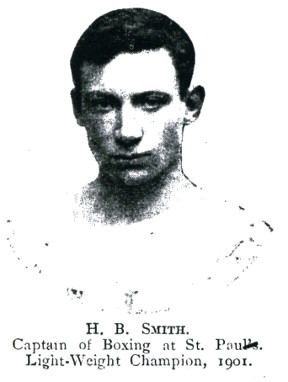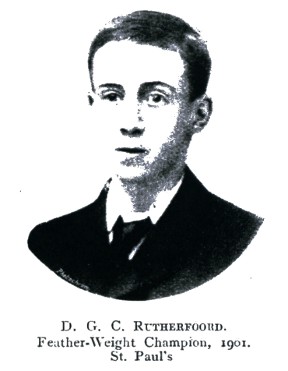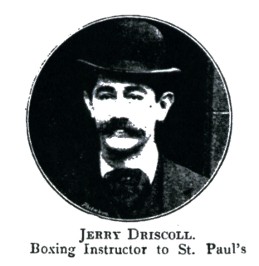Public School Magazine, June 1901

THERE is no other Public School which has taken up any one branch of athletic exercise as a special subject, so to speak, and monopolised it in the way in which St. Paul’s have monopolised boxing. Rugby generally have a capable football fifteen, and the representatives of Cheltenham are never far off the gymnastic shield at Aldershot; but even their success is less marked than that of St. Paul’s in the exercise of the noble art.

It is in the manufacture of middle-weights that the school particularly shines. Ever since the boxing competition was first instituted, silver medals have been won regularly at this weight. Ambrose, Squires, Wolff and S. A. Macmillan were all in this class. Of these Ambrose was probably as fine a boxer as has been seen in the Public School ring. He continued his success at Cambridge, doing as he liked with the Oxford representative in the Inter-’Varsity competition. Squires and Wolff were fighters rather than boxers, pursuing the rushing style that makes things so peculiarly unpleasant for the other occupant of the ring. It is this style that Laertes advises his son to adopt in the well-known melodrama “Hamlet.” “My son, beware of entry to a quarrel, but, being in, go for the point of the jaw and see that you get it.” I quote from memory, so errors may have crept in.
MacMillan, the champion middle-weight of 1900, was possessed of a “slingy” left, and combined science with vigour.
In the other weights, with the exception of the catch-weights, almost equally remarkable success has attended the Pauline glove. The silver medals for light and feather weights were won by the school, both last year and this, the former by H. B. Smith, the present captain, on both occasions, the latter by H. A. Ward and D. G. Rutherfoord. It is extremely probable that Smith would have won the middle-weights if he had not managed to keep himself down to the necessary ten stone, for Douglas, of Felsted, who secured the Championship, was one of last year’s light-weights on the occasion when Smith first won the medal. It is a very unusual occurrence for a competitor to be just under 10st. for two years, and it speaks well for his condition. In 1900 it was only after a series of desperate fights that Smith finally came off the winner, but this year he was a long way better than any of the rest, his superior strength doing him good service. “His best hit,” says the Sportsman, “is a left hook.” He is, like Squires and Wolff, a rushing two-handed boxer. Rutherfoord whose opponent in the final was A. E. J. Collins, of record score fame, is small for a champion boxer, but is probably the neatest and most stylish of all the Paulines who have appeared at Aldershot.
Much of the school’s success is due, of course, to the coaching its representatives receive at the hands of the redoubtable Jerry Driscoll, ex-champion of the Navy. But it must be remembered that he has only done the coaching for the last two years, which still leaves a large margin of success unaccounted for, including the remarkable year when the school was second in gymnastics and won three silver medals at boxing. So that, on the whole, it is probably not so much the skilled tuition that brings success, as the natural keenness of the school to keep up the tradition.

Boxing at St. Paul’s flourishes in the Christmas and Lent Terms. There are two competitions, one in November, the other in February. The former is confined to novices, those who have never won a prize. This is an excellent idea, and probably accounts to a great extent for the keenness and soundness of the school boxing as a whole. For Jones, who would fight Robinson for, and in consideration of, the sum of two-pence, has a natural hesitation in entering the ring with Thomson, who he saw last year, amidst terrific excitement, nearly knock Brown’s head off. In this competition that elusive quarry, the unknown genius, is marked down and noted for future coaching.
In February, towards the end of the month, comes the real thing, the open competition. To win in this means that you represent the school at Aldershot, and to represent St. Paul’s at Aldershot generally means, as we have seen, the Public School Championship of your weight.
No article on St. Paul’s boxing is genuine firstly without the maker’s name on the label, secondly without mention of Sergeant Wood, the chief instructor of gymnastics, who coaches the novices assiduously, and helps Driscoll minister to the school champions at Aldershot.
Patient perseverance produces pugilistic prodigies might well be their motto. Probably it is.

 Madame Eulalie’s Rare Plums
Madame Eulalie’s Rare Plums